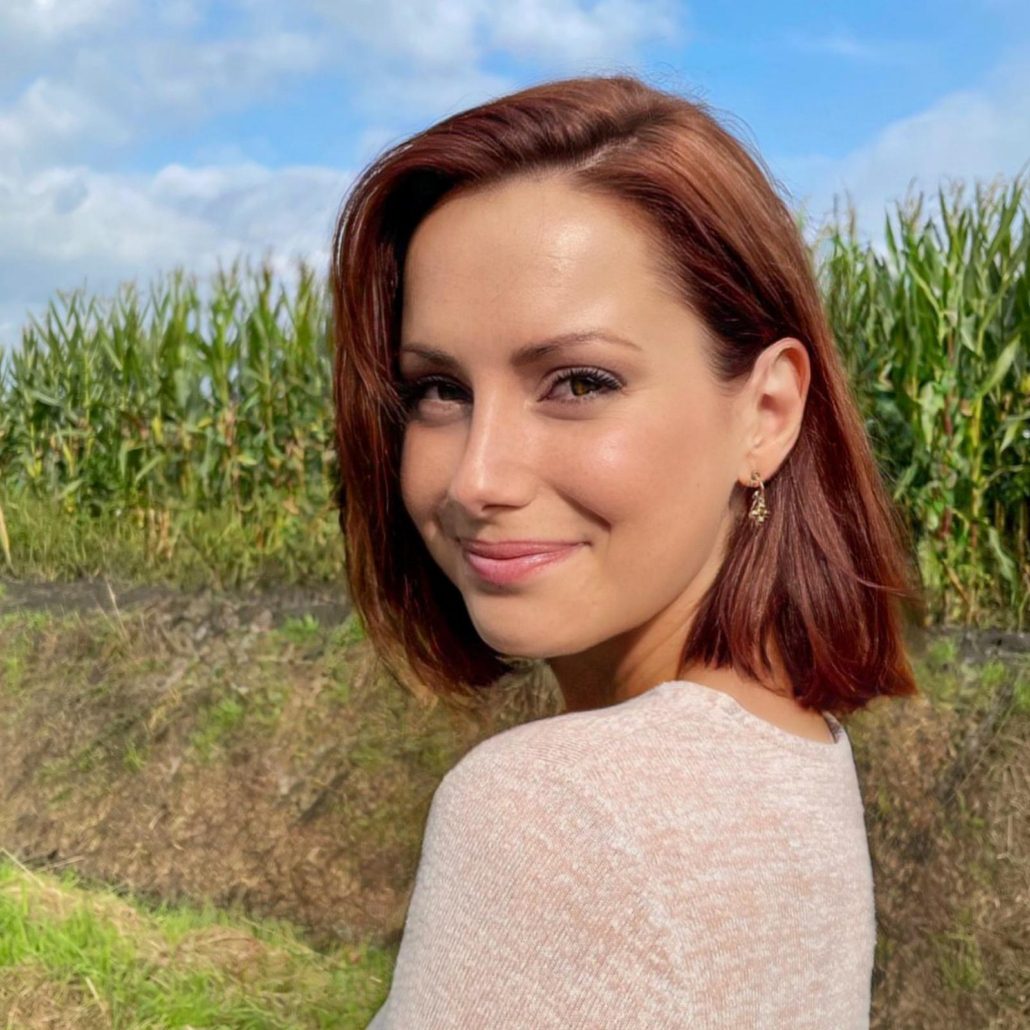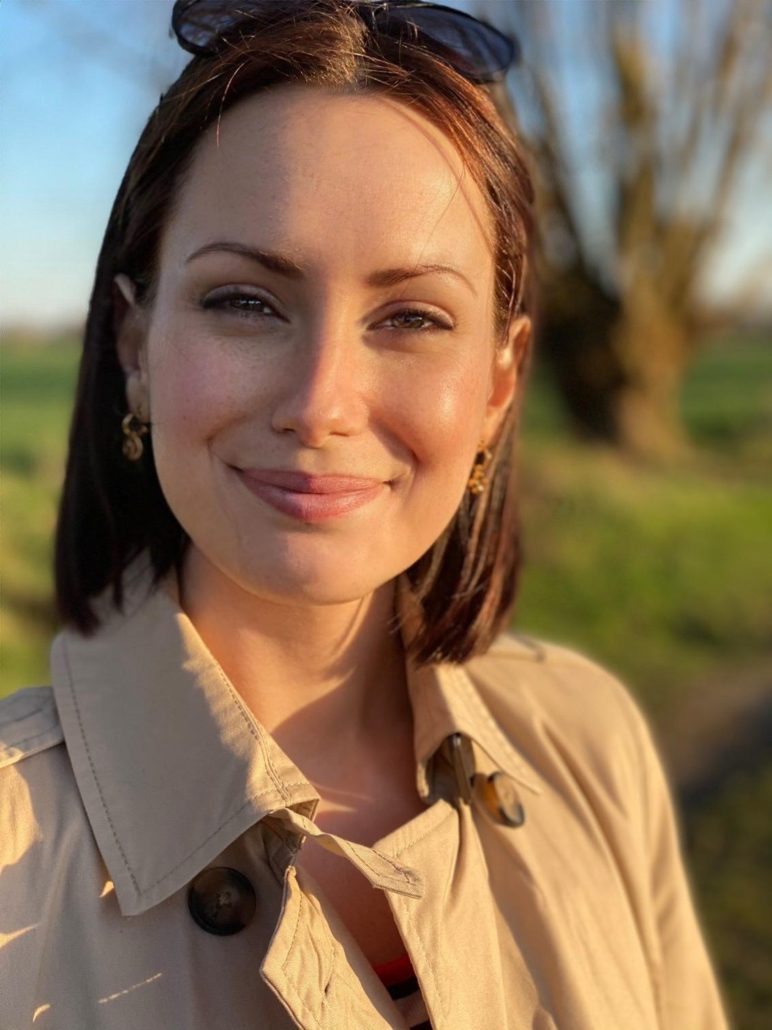“I always carry painkillers and Buscopan with me when I leave home.”
Interview with Endometriosis Patient Jenni
Jenni endured a 12-year wait for her endometriosis diagnosis. However, another diagnosis loomed, as a fibrin disorder led to adhesions with each surgery and wound, intensifying her discomfort. In our conversation, she shares her journey and delves into this distinctive diagnosis.
Thank you for taking the time to join us today to discuss your endometriosis. Please introduce yourself.
Jenni: Of course, I’m Jenni, 34 years old, and I received my diagnosis approximately 2 years ago after an agonizing 12-year wait. Over that time, I underwent multiple surgeries, each time being told I had adhesions that were subsequently released. Unfortunately, no one delved deeper into the source of these adhesions or the nature of my condition. It was not until two years ago, when I sought care at a different hospital, that a more comprehensive examination revealed the truth. Regrettably, I also had to undergo a hysterectomy, which was emotionally challenging.
How has receiving the endometriosis diagnosis impacted your life?
Jenni: Receiving the endometriosis diagnosis two years ago was a mixed experience. On the one hand, it provided relief because I finally had confirmation that my suffering was not imagined, and it explained the root cause of the adhesions. On the other hand, it was a sobering realization that I now had a chronic, incurable condition that I would have to manage indefinitely. I must admit that I initially tried to distance myself from this reality.
I knew the condition had a name now, but I did not engage with it much until 6 months ago, when I experienced another severe flare-up of pain, compelling me to return to the hospital. I could no longer endure the agony. I’ve been grappling with both persistent, everyday pain and unbearable relapses. Regrettably, my doctors informed me that laparoscopy was no longer viable due to the extensive adhesions and fusion within my abdomen. Consequently, they decided not to operate unless my life was at risk. They also emphasized the severity and unimproving nature of my advanced endometriosis, urging me to acknowledge the condition, understand its implications, and seek ways to manage it. This served as a turning point for me to take action.
Could you share your medical history leading up to the diagnosis? You mentioned multiple surgeries. What was suspected during those times, especially about the adhesions?
Jenni: As a teenager, I suffered from intense period pain. I found myself in the hospital nearly every month, vomiting from the pain, fainting, and doubled over in agony. At the time, I was informed that my severe pain was due to a retroflexed uterus, and I did not initially question this explanation. When I was 16, I underwent an appendectomy, and adhesions were discovered. However, these were dismissed as something some people naturally develop without further investigation. Following the birth of my first son in 2009, adhesions were again detected during a cesarean section. A year later, I required surgery due to adhesions at the scar site. In 2011, during my pregnancy with my second son, I faced complications. Only half of my uterus had developed, leading to early contractions and the need to lie down throughout the pregnancy. During delivery, my uterus stuck to my bladder, and both adhered to the abdominal wall, unbeknownst to us. Every contraction tore these connections, resulting in severe internal bleeding and an emergency C-section.
Repetitively, doctors explained to me that the issues stemmed from the surgeries. They clarified that whenever the adhesions were freed, 2 new spots would form and eventually fuse. This cycle continued, resulting in 4 new fused areas. This was the consistent explanation I received. However, my experience took a turn 2 years ago when I felt unwell while staying at my parents-in-law’s place in Essen. I sought help at a local hospital, where the approach was markedly different. I consulted 4 different senior physicians who expressed the need to investigate further. They conducted another challenging laparoscopy despite my prior hysterectomy in 2015. In Essen, samples were taken, sent for pathology, and the diagnosis of endometriosis was established. Additionally, I was diagnosed with a fibrin disorder, a condition involving the overproduction of the body’s natural wound-sealing glue, which hemophiliacs lack. In my case, my body excessively produces fibrin in response to any injury or pain, leading to adhesions.
Did the removal of your uterus bring about any changes in your condition? It seems that the multiple surgeries and examinations did not have a substantial impact.
Jenni: Actually, it did not bring about any significant changes. I continued to experience adhesions, persistent pain, and discomfort. While the absence of menstruation made things somewhat easier, the regular pain remained largely unaffected.
How did the people in your life respond to your complaints before you were diagnosed and during this period of ongoing pain?
Jenni: The reactions were quite varied. My ex-partner, the father of my children, and my former parents-in-law were understanding and supportive. However, during my teenage years, it was a different story. I frequently had to cancel plans due to intense pain. While canceling once is acceptable, canceling 10 times a month as a teenager led to less sympathy. My teachers back then often dismissed my pain, attributing it to mere excuses and suggesting I take an ibuprofen to alleviate it. The situation has changed significantly now. My current husband is incredibly understanding and provides support every day in any way he can. He’s always eager to educate himself about the condition by reading or talking to others. My friends also exhibit understanding, though there are limits to their patience. If I frequently express not feeling well and have to cancel plans, it can understandably become frustrating for them. Nonetheless, I have encountered a substantial amount of understanding and support up to this point.
I do not believe that the need to justify oneself changes with age. There is an enduring feeling that you have to explain, even though deep down, you know it should not be necessary. However, you also want people to grasp why you are canceling plans. The level of understanding largely depends on the individuals involved. Why do you think endometriosis is frequently underestimated as a medical condition?
Jenni: I only started delving into this issue a few months ago, and as an individual living with endometriosis, it has been quite disconcerting to realize how many women are affected, yet so few people are aware of it. When I spoke to people after my diagnosis and mentioned that I had endometriosis, no one responded, “Oh, I’ve heard of that.” Instead, it was met with a collective question mark, and perhaps this lack of awareness among the general population is a significant factor contributing to the lack of understanding for those affected. Even some doctors I’ve spoken to weren’t familiar with it. It makes one wonder whether this is due to the topic’s absence in medical training or studies. While we’re now seeing some improvement in raising awareness about endometriosis, I believe there’s still much work to be done. I think this pervasive lack of awareness leads to the condition being underestimated.
That is a very valid point. It is often compared to oncology. Cancer, while undeniably dreadful, garners immediate sympathy for the patients. On the other hand, if you have a chronic condition that inflicts extreme pain, it is often dismissed because it is not immediately life-threatening. Then there are conditions like Crohn’s disease that everyone seems to know about, and, as a result, those affected receive more compassion. Now that you have your diagnosis, what advice would you offer to other women who may be uncertain whether they have endometriosis?
Jenni: If I could go back and do it all over again, my advice would be not to let doctors dismiss my concerns and not to settle for the initial explanations. If I had been more proactive, paid closer attention to my body, and pursued further investigations, I believe I could have received a diagnosis much sooner. It is crucial to reach the point of early recognition of endometriosis and seek early treatment options.
What limitations do you currently face daily, and what strategies do you employ to cope with them?
Jenni: Over the last 2 years, my symptoms have worsened significantly. Previously, I experienced pain flare-ups every few months, which I managed with Novalgin and a lot of heat. Now, it’s challenging to maintain my daily routine. I find myself on the couch with pain medication and a hot water bottle each evening. My husband and I used to love hiking, and I could cover 20 km daily. Now, I start feeling pain after just 5 km, and I have to stop. Although these episodes still occur, I’ve noticed that my body is progressively closing up. I’ve developed allergies to Novalgin, and paracetamol and ibuprofen no longer provide relief. I was offered a mild form of morphine, but at 34, I’m apprehensive about starting it. I have profound respect and fear of it; it’s a measure of last resort. Buscopan, in combination with painkillers, is somewhat effective. During a pain flare-up, the hospital is the only place that genuinely provides relief; it’s unbearable otherwise.
I understand your concerns about opiates, as they can quickly lead to dependency. It is indeed a dangerous path.
Jenni: If the pain starts, I don’t leave my home without painkillers and Buscopan. In the past 3 months, as we ventured further from home, I’ve experienced an overwhelming inner restlessness akin to the initial stages of panic attacks. I’ve noticed psychological effects that I hadn’t experienced before. When we’re in crowded places, and I’m aware that any issue would be evident to everyone, it borders on a panic attack. If this persists or worsens, I’m considering therapy. I take immense pleasure in being outdoors and strive to maintain a positive outlook despite everything, keeping my spirits high. Being unable to go outside is the most challenging aspect for me.
I sincerely hope there will be an improvement for you, as the solace of nature and its movement should ideally contribute to your well-being. You aspire to recover. When hiking, which typically brings peace and relaxation, no longer provides that solace, it can be pretty challenging.
Jenni: Especially with the children. I’m very mindful not to let my nervousness affect them in any way. I consciously confront those situations rather than avoid them because running away would only make things worse. It’s essential to me that I can still engage in all activities with my children, go out as much as possible, and ensure they don’t suffer due to my illness.
You have endured this journey for an extended period and faced numerous challenges. You are undeniably strong. It is also essential to acknowledge that having days when you do not feel strong is entirely okay. Finding peace within yourself and accepting the condition is crucial. This includes recognizing that there are certain things you may no longer be able to do and that you will have better and worse days. Constantly blaming yourself for what you cannot do will only add unnecessary stress, and with endometriosis, you do not need stress. What are your hopes for the future concerning endometriosis in general?
Jenni: While it would be wonderful if endometriosis could be cured at some point, I don’t expect to witness that in my lifetime. My most sincere wish is that comprehensive research continues, and shortly, there will be effective treatments that genuinely alleviate the suffering of women with endometriosis. Education is critical – more knowledge, facts, and awareness about the condition. It is crucial that as many people as possible understand what endometriosis entails and that those afflicted receive the recognition every woman with endometriosis deserves. Acceptance and avoiding isolation are also of paramount importance. You’re not alone, but more people must be aware of endometriosis.
By sharing your story, we are making significant strides in raising awareness about the impact of endometriosis on women’s lives. It is vital to share these stories so that people can recognize that it is not a walk in the park. Endometriosis is not merely a woman’s ailment or slightly more severe period pain; it’s a complex condition with profound implications. Thank you so much for sharing your story with us.
- “Take yourself and your endometriosis seriously. You are not imagining things!” - 7. November 2023
- Interview with Endometriosis Patient Nina - 7. November 2023
- Interview with Endometriosis Patient Nina - 7. November 2023



